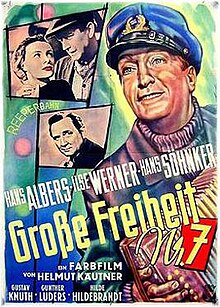Große Freiheit Nr. 7
| Große Freiheit Nr. 7 | |
|---|---|
 Theatrical release poster | |
| Directed by | Helmut Käutner |
| Written by | Helmut Käutner and Richard Nicolas |
| Produced by | Hans Tost |
| Starring | Hans Albers |
| Cinematography | Werner Krien |
| Edited by | Anneliese Schönnenbeck |
| Music by | Werner Eisbrenner |
| Distributed by | Deutsche Filmvertriebs (DFV) |
Release date |
|
Running time | 111 minutes |
| Country | Template:Film Nazi Germany |
| Language | German |
Große Freiheit Nr. 7 (Great Freedom No. 7) is a 1944 German musical drama film directed by Helmut Käutner. It was named after Große Freiheit (grand freedom), a street next to Hamburg's Reeperbahn road in the St. Pauli red light district.[citation needed]
The film is also known as Port of Freedom in the United Kingdom.
Plot summary
This section needs expansion. You can help by adding to it. (August 2011) |
The film tells the story of the blond "singing sailor" Hannes Kröger (played by Hans Albers) who works in a Reeperbahn club and falls in love with a girl played by Ilse Werner.
Cast
- Hans Albers as Hannes Kroeger
- Ilse Werner as Gisa Häuptlein
- Hans Söhnker as Willem
- Hilde Hildebrand as Anita
- Gustav Knuth as Fiete
- Günther Lüders as Jens
- Ilse Fürstenberg as Gisa's mother
- Ethel Reschke as Margot
- Erna Sellmer as Frau Kaasbohm
- Kurt Wieschala as Jan
- Helmut Käutner as Karl
- Richard Nicolas as Admiral
- Maria Besendahl as Frau Boergel
- Justus Ott as Herr Wellenkamp
- Gottlieb Reeck as Herr Puhlmann
- Thea Thiele as Consul's wife
- Alfred Braun as Rundfunkreporter
- Rudolf Koch-Riehl as Master of ceremonies
- Karl-Heinz Peters as Postman
- Erwin Loraino as Sailor
Soundtrack
- Hans Albers - "Auf der Reeperbahn"
- Hilde Hildebrand - "Beim ersten Mal, da tut's noch weh"
- Hans Albers - "La Paloma"
- Hans Albers - "Nein, ich kann Dich nicht vergessen"
- Hans Albers - "Schön ist die Liebe im Hafen"
- Hans Albers - "Was kann es denn schöneres geben"
- Hans Albers - "Wenn ein Seemann mal nach Hamburg kommt"
Production
Due to the threat of Allied bombing raids to Hamburg Harbour and to the Ufa studios in Berlin's Neubabelsberg and Tempelhof when it was made in 1943 (May to November), most of the movie was shot in Prague's Barrandov Studios by Helmut Käutner, as the first Agfa colorfilm by Terra. For a scene with a boat trip in Hamburg harbour warships had to be covered up. [citation needed]
Reception
Nazi propaganda minister Joseph Goebbels was dissatisfied, and demanded many changes to make the film more "German", for instance by renaming the lead role from Jonny (as in Albers' earlier hit song "Good bye, Jonny") to Hannes. After a year of editing, the movie was banned anyway in Nazi Germany on 12 December 1944,[1][2] and was only shown outside of the Großdeutsches Reich proper, with the premiere on 15 December 1944 in Prague (then a Reichsprotektorat). It remained banned in Nazi Germany, opening on 6 September 1945 in Berlin's Filmbühne Wien after the Allied victory.
References
- Rüdiger Bloemeke: "La Paloma - Das Jahrhundertlied". 158 Seiten, über 30 Seiten Farb- und Schwarzweiß-Abbildungen. Voodoo-Verlag, Hamburg 2005
External links
- Große Freiheit Nr. 7 at IMDb
- Große Freiheit Nr. 7 is available for free viewing and download at the Internet Archive
- Große Freiheit Nr. 7
- http://www.der-blonde-hans.de/albers10a.htm
